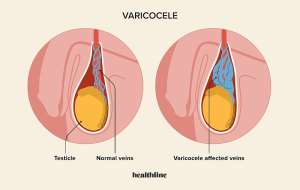
Dr. Paul Adu, a Ghanaian medical expert, recently cautioned men about varicocele, a condition that can lead to infertility if left unaddressed.
Varicocele causes distended veins in the scrotum that may develop into pain, swelling, and testicular atrophy over time.
According to Dr. Adu, varicocele “feels like a bag of worms beside [the] balls, accompanied with pain.”
The left side is most commonly affected, and symptoms worsen when standing but improve lying down. While often asymptomatic, varicocele causes male infertility in many cases.
The veins cannot properly regulate scrotal temperature and blood flow, damaging sperm production and development.
“Though Varicoceles may be asymptomatic, they are common causes of male infertility. This is because the male sperm cells are very fragile & varicoceles create temperatures that are not suitable for sperm production,” the medical expert explained in a portion of his series of tweets.
For those with symptoms like pain, swelling or infertility, varicocelectomy surgery is recommended to restore venous function and fertility.
Dr. Adu affirmed, “After surgery, researches have shown that men are still able to impregnate their partners!” However, asymptomatic varicocele may require no treatment or monitoring instead.
Either way, he urged men to “check if [they] have varicoceles and get treatment if indicated.”
"Varicocele causes preventable infertility and intimacy issues, so awareness and medical advice are critical.
"By diagnosing varicocele early, conception and healthy sexual experience may remain possible."
For those concerned, Dr. Adu provided this list of varicocele symptoms and characteristics to watch for:
1. Enlarged, tortuous vein in the scrotum
2. An intermittent feeling of weight or dragging in the scrotum
3. Scrotum pain increasing upon standing
4. Decreased testicle size
5. Most often left-sided
6. May disappear lying down depending on severity
7. Can cause severe pain interfering with sex and intimacy
Check his tweet on the issue below;





 Dumsor: Energy sector ‘shepherdless’ – Nana Amoasi VII
Dumsor: Energy sector ‘shepherdless’ – Nana Amoasi VII
 Train accident: Four more grabbed and remanded
Train accident: Four more grabbed and remanded
 Gov't to consolidate cash waterfall revenue collection accounts
Gov't to consolidate cash waterfall revenue collection accounts
 Gov't to settle lump sum for retired teachers by April 27
Gov't to settle lump sum for retired teachers by April 27
 Former PPA CEO granted GH₵4million bail
Former PPA CEO granted GH₵4million bail
 Dumsor: The darkness has exposed you; you’ll go down as the worst in Ghana’s his...
Dumsor: The darkness has exposed you; you’ll go down as the worst in Ghana’s his...
 Dumsor: The ‘incompetent’ person provided a timetable whiles those who came to s...
Dumsor: The ‘incompetent’ person provided a timetable whiles those who came to s...
 Defend, ensure NPP’s good works are ‘sold’ and highlight the ‘bad’ state of the ...
Defend, ensure NPP’s good works are ‘sold’ and highlight the ‘bad’ state of the ...
 Bawumia will rank high ahead of Mahama in any anti-corruption test — Salam Musta...
Bawumia will rank high ahead of Mahama in any anti-corruption test — Salam Musta...
 NPP trying to bribe us but we‘ll not trade our integrity on the altar of corrupt...
NPP trying to bribe us but we‘ll not trade our integrity on the altar of corrupt...
